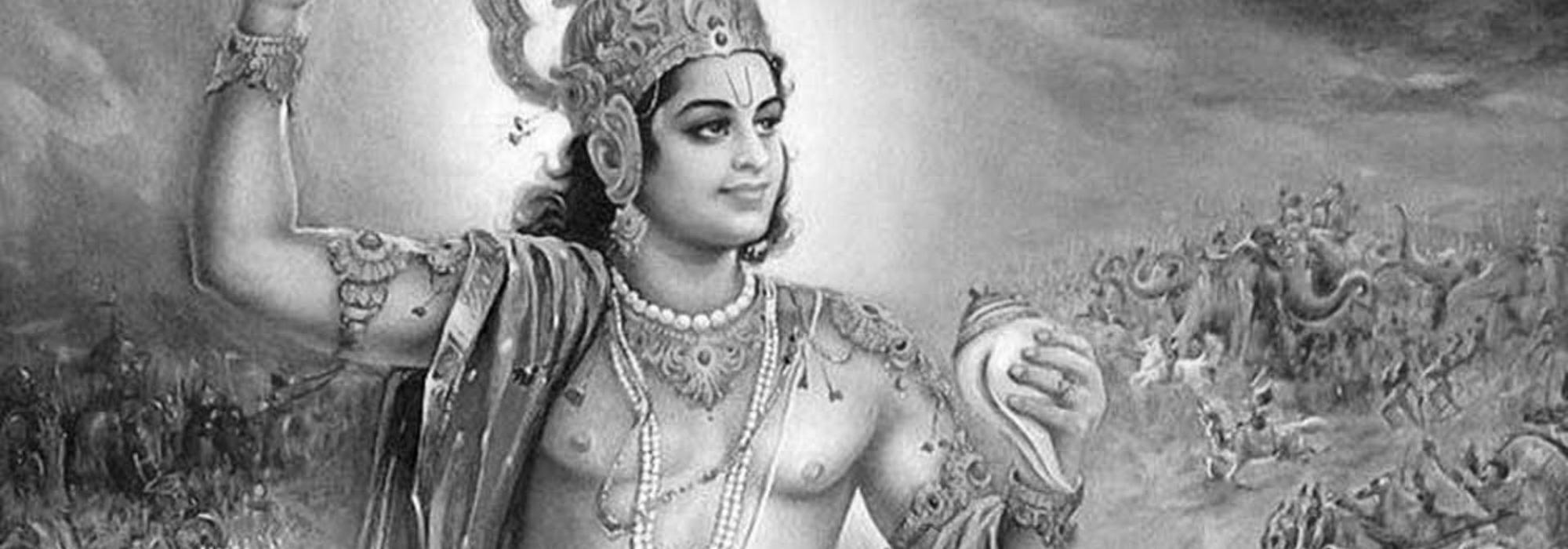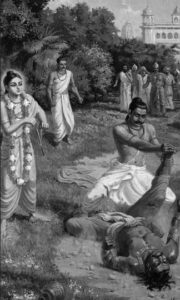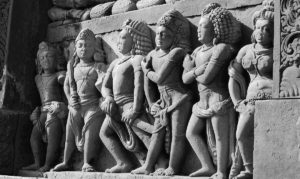As individuals, we can be utterly honest and upright. But that will not work at the societal realm. A public figure will have to resort to strategies. We see Krishna’s brilliance and foresight throughout. Long before he befriended the Pandavas, he was laying out a strategy for change.
As a raw teenager, raised in a village, he comes to the capital and kills Kamsa. Immediately he sends a warning to Dhritarashtra saying, Your brother’s widow and his children are returning from the Śataśṛṅga mountain. Take good care of them. Don’t be unjust to them in your mad love for your son!
It’s not enough for a public figure to think merely about his town or city. He has to be aware of what is happening all over the world. Foreign policy depends on the behaviour of other nations; it’s highly relative. If someone asks, “What is India’s stand on this issue?” There is no immediate answer. We have to observe what others are saying and doing, and then take a stand that is most beneficial to our country.
Mathura was on the banks of the Yamuna, near today’s Agra. It was not a secure region. It was constantly prone to attacks. All around—in the whole of Āryāvarta—he did not find any honest king. It was only the Pandavas who seemed to be trustworthy and noble. If we look at the establishment of those days, it becomes clear. Mathura was near today’s Agra. Hastinavati was close to today’s Meerut. Magadha was where Bihar is today. Pragjyotishpura was near modern Guwahati. Narakasura was ruling over Pragjyotishpura. He was great friends with Jarasandha, who ruled over Magadha. Paundraka Vasudeva was ruling over the region what is Bengal today. In Karavirapura, which is modern Maharashtra, there was Srigalava Vasudeva. In the region that is Vidarbha (southern part of Madhya Pradesh), there was Rukmi. The region of Bundelkhand (northern part of Madhya Pradesh) was the land of the Chedis, ruled by Shishupala. In the region surrounding the Gujarat-Madhya Pradesh border lay Avanti, ruled by the brothers Vinda and Anuvinda. Almost all of these kings were hostile and wicked.
Further if we go near Jaipur, we get the kingdom of Matysa, which was practically ruled by Kichaka, the brother-in-law of King Virata, who had become a puppet in his hands. In the South, except for the Pandyas, all the others fought on the side of the Kauravas. In the north we have Kashmira, which was ruled by Gonanda of the Kākoṭaka vaṃśa, also an ally of Duryodhana. To the west, we have Madra, Sindhu, and Gandhara. King Shalya of Madra fought along with the Kauravas. King Jayadratha of Sindhu was married to Duryodhana’s sister. Dhritarashtra’s wife Gandhari was from the kingdom of Gandhara. Shakuni and his father were managing Gandhara. Further west was the kingdoms of the Yavanas, ruled by Kalayavana, who was an ally of Jarasandha. With such hostility all over, how to go forward, how to strategize, what to do?
Krishna realized that the only ones who might be on his side are the sons of Pandu. They were all born through the blessings of various deities and grew up in the serene Himalayas, far from the deceitful atmosphere of the palaces. Krishna felt that there might be a streak of integrity and goodness in them. He befriended them as he felt that they too respected the same values as he does.
There were also a few good people who had become evil due to circumstances. The king of Kashi was one of them. Drupada, the king of Panchala was another. These people would be good only if they mixed with good people. If they were left alone, they would easily degenerate into becoming evil. As for the rest, they were not only evil themselves but had an evil influence on others. Amidst such people, if Krishna had to toil for universal welfare, then one can imagine what kind of ordeals he must have gone through!
It was during the svayaṃvara of Draupadi that Krishna first sees the Pandavas. While everyone in the assembly has their eyes riveted on the beautiful Draupadi, Krishna points out to Balarama the five Pandava brothers sitting disguised as brāhmaṇas. Krishna had taken several of his kinsmen to the svayaṃvara including his devoted disciple, the invincible Satyaki; his dear cousin Uddhava, who shared a birthday with him; his brother Balarama; Kritavarma; Gada; and Shini. Each one of them was a great warrior, easily capable of stringing the great bow. When people like Duryodhana and Karna tried and failed, the Yadavas wanted to give it a shot. But Krishna stopped them. He said, This is not for us. We have just come to see. Why did Krishna control them? Why didn’t he participate himself? He wanted Arjuna to prove his worth on that day, thus displaying his prowess to all the great kings assembled there. We see the nurturing side of a true statesman. When he realized that someone was capable, he gave them a launch-pad. The svayaṃvara of Draupadi proved to be that platform for Arjuna. This was a strategy, but Krishna had to be willing to appear smaller and weaker in front of Arjuna. It is child’s play for Krishna to string a bow and shoot an arrow. In fact, he too had got married in a similar manner. But he held back, giving a chance to Arjuna, thus boosting the confidence of the Pandavas.
Then Krishna got Bhima to kill Jarasandha. There was absolutely no enmity between Jarasandha and the Pandavas. But he has a huge list of reasons to hate Krishna and the Yadavas. It was Krishna who killed Kamsa and widowed his daughters. The Yadavas drove him away. A mere cowherd boy consolidated the Yadavas and challenged his sovereignty – naturally Jarasandha was upset. Krishna could have also killed Jarasandha but he put Bhima forward. Bhima got the credit and people began fearing the Pandavas. Krishna promoted Arjuna and Bhima because they were courageous, competent, and noble. They needed the support and Krishna gave it to them.
One wonders why he didn’t help any of the Yadavas get the credit. The reason was perhaps this: The Yadavas had a democratic setup. They were composed of several republics and each republic chose their own head. Therefore there was always infighting and disregard towards each other. Further, after moving to Dvaravati, they had started businesses and were focussed on trade. They had started seeing wealth and were willing to make compromises with regard to dharma. They were beginning to lose their kṣātra. Instead of trying to change that establishment, Krishna decided to support an individual who would be a good king. That will take care of everything. Dharmaraja was one such person. Among the Yadavas, the only person who was really fit to rule as king was Krishna but he had declared that he would not be king. Therefore he supported the Pandavas. None of the Yadavas had foresight. Balarama’s was Krishna’s own brother but what a big difference in their personalities. Balarama spent his time thinking about the past, drinking, and gambling. Satrajit was only interested in money. All his efforts were directed towards earning more wealth. As for Ugrasena, he was just a rubber stamp ruler. Vasudeva was too busy with his family. They were wealthy and complacent in general. They were not willing to take risks. There were no eligible candidates. Just because they were his people, Krishna wasn’t attached to them. He behaved like a true statesman and supported the most capable person. He realized that only the Pandavas can serve as a tool for his larger vision.
Krishna wanted a good person to rule, it mattered little whether he was a family, friend, or stranger. He never fell into emotional traps. He wanted to support someone who was at once noble and willing to take risks. Duryodhana was willing to take risks but he was unrighteous. Some of the Yadavas were righteous but were unwilling to take risks. So Krishna chose the Pandavas, and having chosen them he supported them till his last breath.
When the Pandavas went into exile, Drupada and Drstadyumna visit them only once. It is Krishna who visited them often, giving them his support, advice, and assurance at all times. He didn’t want the motivation of the Pandavas to wane. Except for their one year in incognito in the Matsya kingdom, Krishna was in constant touch with them. A public figure must always be in touch with good people, irrespective of the circumstances. From the grass-root level to the highest echelons of society, he must be in touch with all the good people.
If we see Krishna’s behaviour during the Rājāsūya yajña episode, we learn so much about his personality. Yudhistira asked him, “All my people are encouraging me to perform the Rājāsūya. You are the only objective person around. Tell me for certain if I am really worthy of this. I come to you, for I know that you will always speak the truth!” Krishna replies, “You are a worthy person, but you can’t perform this yajña as long as Jarasandha is alive. He is an emperor and he must be killed.” Even when his friend asks him for his view, he tells him nothing but the truth. He is gentle and eloquent, but bold, straight, and firm.
Krishna’s son Samba was married to Duryodhana’s daughter Lakshana; that is their relation. When Krishna goes to Hastinavati for the peace talks, Duryodhana invites him to dine at his palace. Krishna refuses. He tells Duryodhana that people who are on a mission should not stay with the other party until the mission is accomplished. He has come as an emissary of the Pandavas; if he has dinner with Duryodhana, will that not arouse suspicion! You accept for peace and then I will eat at your place! he says. After all, why does one go to another’s house for dinner? Either the person is hungry and helpless or he has affection towards the other person. What Krishna is essentially saying is: If you really have affection, accept for peace and I will come. And if you don’t have that affection, then I am not helpless person! Krishna can say it straight, without hesitation, without malice.
Duryodhana’s father Dhritarastra goes a step ahead. Hearing the news of Krishna’s arrival as an emissary, he orders lavish meals, gifts, garlands, ornaments, slave-girls, and all sort of luxuries for Krishna. Vidura rebukes his elder brother with the words, “Who do you think Krishna is? Do you think he’s a person who’ll fall for cheap parlour tricks? He will be happy only if you agree for peace. None of these things can move him.” Krishna was the ideal public figure – he never fell for any temptation, physical or emotional.
To be concluded.
This serialized article has been translated by Hari Ravikumar from the author’s Kannada lecture held at the Gokhale Institute of Public Affairs, Bangalore in 2009.



















































Comments